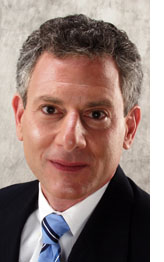| |
|

NOW-SUNDAY, SEPTEMBER 7

SUNDAY, SEPTEMBER 7Ner Tamid Synagogue Open House and Barbecue
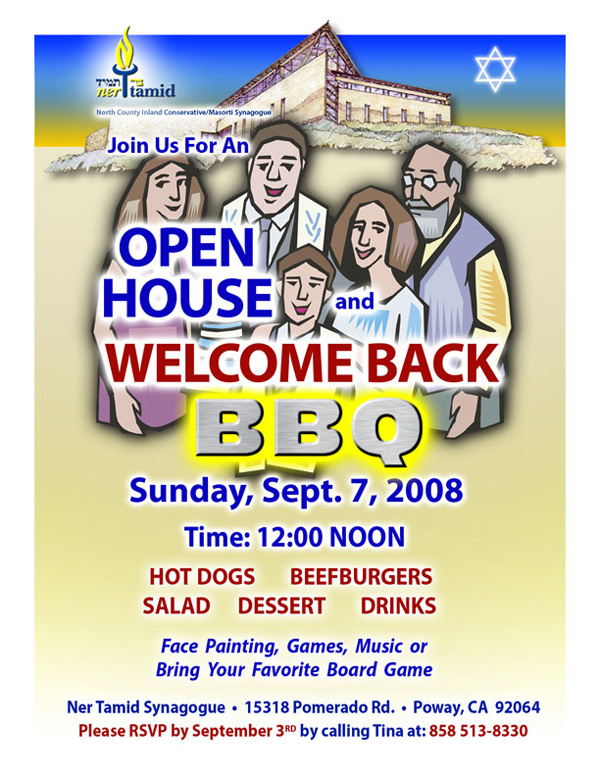
FRIDAY, SEPTEMBER 12, 2008 Temple Solel S'more Shabbat

________________________________________________________
MON., SEPT. 29-THURS., OCT. 9



Emergency campaign to rescue the Jews of Georgia
Chief Executive Officer, United Jewish Federation of San Diego County

LETTER FROM JERUSALEM
Russian-Georgian conflict reverberates through Israel; chills its FSU relations
By Ira Sharkansky
 JERUSALEM--There are probably 1.5 million Russian speakers in Israel, and among them 75,000 speakers of Georgian. JERUSALEM--There are probably 1.5 million Russian speakers in Israel, and among them 75,000 speakers of Georgian.
So we are getting a lot of news and commentary about the war.
We may not know what is happening.
The people who know both countries well are saying, "Do not believe either of them."
It is also apparent that some commentators are articulating ingrown perspectives, as well as their assessments of what has happened since the last time they spoke.
On the one side are a lot of people who are supporting Georgia. Their cause seems just in wanting to keep control of ethnic enclaves within their country. The Russian attack has been brutal, and has gone beyond pushing Georgian troops out of enclaves whose residents had sought Russian protection. We have heard that Russian tanks are moving toward a major port, as well as toward the national capital of Tbilisi, or have even surrounded and cut off that city.
No assertions of Russian aggression come without parallel denials from Russian authorities, and further warnings by knowledgeable Israelis that they are not sure who is telling the truth.
It is not only Israelis of Georgian origin who are supporting the Georgians. Some Jewish commentators from European Russia emphasize the aggression of Vladimir Putin. They assert that he has ignored the more conciliatory statements of the nominal president, Dmitry Medvedev. They say that Putin is exceeding his authority as prime minister by ordering continued military action, in the style of an aggressive Czar or head of the USSR.
Yet other views begin not so much with issues of justice as with issues of wisdom. It appears that Georgia began the fighting. Its leaders may have hoped for American, European, or even Israeli assistance, and did not take account of the prospect that Russia would invade and no one else would do more than criticize.
Israel had supplied Georgia with military equipment and training. Officials here say that they stopped responding when the Georgians requested weapons meant for attack rather than defense. Israel also desisted when warned by Russia that it was upset about the supplies, and would consider Israeli actions when making their own responses to Syrian and Iranian requests for weapons.
The comments of Israeli leaders about the Russian onslaught have been tamer than those coming out of the White House. No point in little Israel threatening big Russia, which holds many of the cards in this region and has not always shown itself to be restrained.
Seymour Yakobshvili, a minister in the Georgian government, is accusing Israel of being a traitor against his country for not continuing the arms shipments or otherwise helping in its predicament.
One does not have to be fluent in Georgian to recognize that Yokabshvili is one of the 12,000 or so Jews still living in Georgia.
It is not yet clear when the fighting will finally stop, and how much control Russia will assert. It is not pleasant to watch an invasion and the loss of national independence. In this case, however, events recall a slogan used to combat road accidents. Drivers and pedestrians should be wise, and not to insist on their rights in traffic. The same message also makes sense for little countries that live alongside big countries.



THE VIEW FROM JINSA
So where was Russian expert Condy Rice before the bombs started falling?
By Shoshana Bryen
 WASHINGTON, D.C.—Some readers were surprised yesterday. "What, no military option? There's something JINSA thinks the U.S. military can't do?" WASHINGTON, D.C.—Some readers were surprised yesterday. "What, no military option? There's something JINSA thinks the U.S. military can't do?"
Actually, there is very little we think the U.S. military can't do, but there is a whole lot we think it shouldn't do and we'd like to keep the two separate as much as possible. This was a job for diplomats, and the diplomats failed.
Our Secretary of State is a Soviet Russia expert. One would have thought she would have been aware of the aggressive tone of the Russian government. One would have thought she would have spent some time this spring discussing the possible negative ramifications of Western successes. We won approval for missile defense radars in Poland and The Czech Republic, and the independence of Kosovo from Serbia, and we were talking to former Soviet Republics about NATO membership. Did she think Russia wouldn't care, or just that it wouldn't respond?
Russia lost the Cold War but it was only one war; neither victory nor defeat has been permanent in Europe. Was there no State Department Team B to play Russia and suggest that given their new wealth, energy relationship with Europe and imperialist past, plus Putin's solid KGB background, they would find a way to reassert themselves?
The wise man said that if your only tool is a hammer, every problem looks like a nail. We have a great hammer, but our toolbox is otherwise deficient. Russia has mostly a hammer as well, but that is sufficient for its "near abroad," and its increasing energy stranglehold on Europe obviates the need for much diplomacy to the West.
A truly powerful country - which the U.S. must be - uses statecraft and military power as two edges of the sword; one good for some thing and one for other things. In this case, however, statecraft was diverted.
Dr. Rice was so busy trying to create Palestine out of a terrorist-run sinkhole that she didn't notice that pro-Western, democratic, free-market-oriented Georgia was in real trouble. So seized was she with solving the "Palestinian problem" in the last few months of the Administration - a common disease - that she missed Russia.
Newspapers report that the Secretary made more than 90 phone calls during the crisis. Why? The damage to Georgia was done from the moment the Russians started shelling. The phone calls should have been made months ago to try to forestall the invasion - plans for which certainly were no secret.
Diplomacy now has to find ways of making Russia pay for violating international norms. No G-8, no WTO, no Sochi Olympics would be a start. Political and reconstruction support for Georgia, and insistence that peacekeepers come from Western or Central European countries would help. Reminding the Russians that Georgia's relationship with NATO comes up again in December might begin to re-establish Western credibility, and perhaps prevent Russia from using that hammer again.

l

Partial JCC Maccabi Tennis Results
Singles
BOYS
Ages 13-14 Competitive: Blue Group: Gold: Aaron Meltzer, San Diego; Silver: Adam Levie, San Diego, Bronze: Ryan Rosen, San Diego
Ages 13-14 Competitive (White Group) Gold: Andrew Levitan, Austin; Silver: Abram Schottenstein, Columbus; Bronze: Mathew Littman, Orange County.
Ages 13-14 Recreational: Gold: David Enav, Houston; Gabe Federman, San Diego; Ben Gothard, New Orleans
Ages 15-16 Competitive (Blue Group)-Gold: Daniel Hyman, Tucson; Silver: Adam Reinhart, Cincinnati; Bronze: Michael Davis, St. Louis
Ages 15-16 Competitive (White Group)-Gold: Conner Jacobs, San Diego; Silver: Brett Gelfand, Atlanta; Bronze: Alex Smith.
Ages 15-16 Recreational: Gold: Jarad Cohen, Birmingham, Silver: Peter Karanevich, Kansas; Bronze: Jordan Feldman-Miami Dade.
GIRLS
Ages 13-14 Competitive: Gold: Sarah Berchak, Birmingham. Silver: Erica Nesses, San Diego. Bronze: Ariela Finkelstein, Mexico.
Ages 13-14 Recreational: Gold: Hannah Appel, Atlanta. Silver: Aubrey Isaacman, Orange County. Bronze: Karly Hampshire, San Diego
Ages 15-16 Competitive: Gold: Rona Lavian. Peninsula, Silver: Paige Press, San Diego, Bronze: Ashlyn Temples, Atlanta.
Ages 15-16 Recreational: Gold: Remy Weinger, San Diego; Silver: Sarah Klein, Springfield; Bronze: Nicole Babaknia, Orange county
Doubles {Incomplete Results}
Girls
Ages 13-14: Competitive: Silver: Lindsey Jacobs and Lexi Goldberg, both San Diego
Ages 13-14 Recreational: Gold: Nicole Belinsky and ___________
Ages 15-16 Recreational: Silver: Ashley Hanson, San Diego and _______________;




THE JEWISH CITIZEN
The kind of friend all may value
Touching the Soul: The Diary of a Jewish Chaplain by Max Fallek, Nodin Press, Minneapolis, ISBN 978-1-932472-77-6.
By Donald H. Harrison
 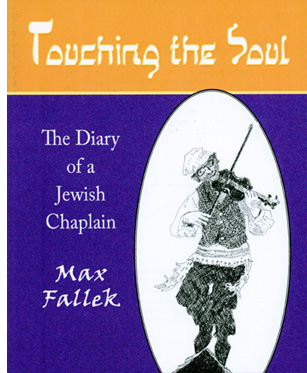 SAN DIEGO—Max Fallek serves as a lay Jewish chaplain in the Minneapolis area in the American Midwest. Only a few chapters into this too-short book, you’ll find that he is a man with a big neshumah as well as a serious love for Jewish deli foods. SAN DIEGO—Max Fallek serves as a lay Jewish chaplain in the Minneapolis area in the American Midwest. Only a few chapters into this too-short book, you’ll find that he is a man with a big neshumah as well as a serious love for Jewish deli foods.
In this volume, he tells the stories of some of the encounters he has had with Jewish patients—stories in which he also likes to teach a bissel Yiddish.
Some of the chapter titles are “A Shaineh Maidel, (A Beautiful ‘Girl)” “A Mitzva Gemach in Gan Eiden” (A Good Work Made in the Garden of Eden), “Alevie (It Should Happen to Me)” “Bashert; (Destined)” “Farblondzhet (Mixed Up, Confused) ” and “Ess Ess Gezunterheyt (Eat, eat in good health)”
In the latter, he tells of a friend who was growing more and more depressed in the hospital. After getting permission from the man’s doctor, Fallek brought him some chopped liver and matza ball soup. “Oy alevi” (what good fortune!) said the man. “Max, how did you know?” Thereafter Fallek regularly stopped at the deli to bring the man such dishes as knishes, corn beef, pastrami, rugalah, and smaltz herring.
He showed similar kindness to other patients. A woman who was terminally ill confided her last wish was to taste a knish again. Fallek made sure she did. A veteran, who always decorated his quarters with a Jewish symbol—such as a menorah for Chanukah, or a seder plate for Passover—got to regularly share an apple strudel, or mandelbroit or other deli dishes whenever Fallek came to call.
Fallek found ways in addition to food to be helpful. For an extremely ill sports fan, he obtained an autographed picture—inscribed to the patient—from Kirby Puckett, the centerfielder for the Minnesota Twins. When a distraught wife told him her husband’s Alzheimer’s disease had progressed so far that they could no longer communicate, Fallek spoke to him in Yiddish. Sure enough that part of his memory remained, and in Yiddish the patient expressed how much he loved his wife, bringing tears to her eyes.
I was at the Kaiser Permanente Medical Center the other day awaiting various blood tests, and as I looked around at other outpatients, I thought that everyone there—or in a hospital—someday will be grateful for a man like Max Fallek coming into their lives, perhaps when they feel that they are at their lowest point. Fallek has the special qualities of being able to listen to what patients want to talk about, and being resourceful enough to help solve many of their non-medical problems.
The entire time I was reading the book, which is only 91 pages, I found myself thinking of Jay Winheld, a kind San Diegan who also had served as a lay chaplain before he died earlier this year. The world is blessed with far too few of these highly motivated individuals whose greatest pleasure lies in helping other people.
If you need to go to a hospital anywhere other than in Minnesota, chances are you won’t be meeting Fallek. You’ll derive some of the man’s great warmth from his book.

DOING IT BETTER
Thoughts on writing a bimonthly column
By Natasha Josefowitz
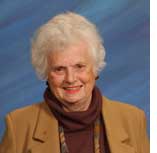 LA JOLLA, California—Writing a bi-monthly column is like having a home for one’s ruminations. One can write secret diaries, paint and never show anyone, dance or play a musical instrument alone, or one can have a stage on which to perform, a gallery to exhibit one’s work or a news publication to share one’s thoughts and feelings. Sharing one’s work makes one vulnerable to criticism and even rejection, yet it is the reaction of others which can validate a work. The purpose of writing is to inform and possibly touch someone, it is to share an idea, something seen, heard, read or felt. It is to not be alone. LA JOLLA, California—Writing a bi-monthly column is like having a home for one’s ruminations. One can write secret diaries, paint and never show anyone, dance or play a musical instrument alone, or one can have a stage on which to perform, a gallery to exhibit one’s work or a news publication to share one’s thoughts and feelings. Sharing one’s work makes one vulnerable to criticism and even rejection, yet it is the reaction of others which can validate a work. The purpose of writing is to inform and possibly touch someone, it is to share an idea, something seen, heard, read or felt. It is to not be alone.
I always read the back cover of books that talk about the author, wanting to know where that person is coming from (metaphorically). In case you do too, I’ll start with the more concrete: I was born in Paris, France from Russian Jewish parents and came to the United States as the war in Europe was escalating. I went through Ellis Island, learned English and became American. Beverly Hills High School, Scripps College, a master’s in social work at age 40, a Ph.D at 50. I’m a late bloomer. I taught the first course on “Women in Management” in the country at the University of New Hampshire, wrote textbooks and humorous verse, was on the business faculty of S.D.S.U., traveled the world lecturing on cruise ships and am currently working on my eighteenth book.
I’ve been married, divorced, and remarried, with five children and seven grandchildren, with my share of failures, disappointments and grief, and now live happily with my husband with a balcony overlooking the ocean, at the White Sands of La Jolla, a retirement community.
I am a formerly young person and now that I am in my early eighties and have wrinkles and grey hair, I can relish an adventurous past, an uncertain future and an exciting present for I have PMZ, post-menopausal zest. We do grow wiser with age, becoming more philosophical and knowing how to have more fun. Growing older provides us the freedom to be more detached from insignificant events, more involved with larger issues and appreciating the humor of the events we witness on a daily basis. A life time of experiences has paved the way for us to trust our hearts as well as our heads expressing with confidence what we know to be true.
Youth thinks it knows
Old age knows to think
It is important for us to live fully each day, postponing nothing, appreciating our health, our family and friends. Whether we are working or not, living with a significant other or living alone, there are still things to learn , new sights to see, books to read, new friends to meet and family to care for and be cared by.
When I was young
I knew the answers
As I grow older
I know the questions
My grandchildren seem to be text messaging all day long, even as they are talking to me, they are e-mailing their friends. If I ask “what are you writing,” they will say “ I’m telling my friends that I’m talking to my grandmother.” Although my writing here is not exactly text messaging, it is another form of communicating, just a bit longer.
Since this is my home, I invite you in , you can write to me to my new e-mail josefowitzn@sandiegojewishworld.com and I will answer. So look for me every second and fourth week , writing about whatever I have found interesting or thought worth while. In the meantime—let’s celebrate today.

.jpg)

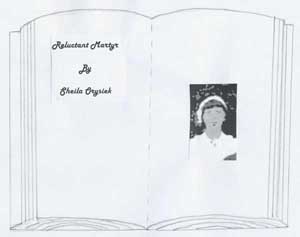 Editor's Note: This is the concluding chapter in our serialization of Reluctant Martyr, a historical novel by our columnist Sheila Orysiek. Hereafter, all 21 chapters of the book may be accessed from the left-hand column of our home page. We thank Sheila for granting us first publication rights to her book. Comments to the author are welcome at orysieks@sandiegojewishworld.com Editor's Note: This is the concluding chapter in our serialization of Reluctant Martyr, a historical novel by our columnist Sheila Orysiek. Hereafter, all 21 chapters of the book may be accessed from the left-hand column of our home page. We thank Sheila for granting us first publication rights to her book. Comments to the author are welcome at orysieks@sandiegojewishworld.com
Chapters 1 2 3 4 5 6 7 8 9 10 11 12 13 14 15 16 17 18 19 20 21
Reluctant Martyr—Conclusion
The Franklin Institute was a venerable place dedicated to expanding the curious mind, much like its namesake. It was in a large old building with rooms divided into science, technology, industry and the simply fascinating. Huge antique steam engines on tracks brought back the days of old travel, and an enormous model of a human heart could be walked through and explored from the inside out. A large pendulum swung with the rotation of the earth and knocked over pins that indicated the time of day. One of Sam’s favorites was a simple demonstration of how a synthetic fiber was made. Two liquid chemicals were combined at a certain height and as they fell together in a small waterfall, formed into fibers by the time they reached the bottom.
The planetarium, one of the few in the world and it was a favorite of the school children who trooped through. A huge arcing night sky was simulated in the theater and stars, planets and comets were projected above. The constellations were marked out and their ancient stories retold. As Hannah sat with her head back to see this vault of stars the lecturer told of the truly unbelievable distances between these worlds. What Hannah found even more unbelievable was that Sam had asked her to marry him.
That night she rushed to the pay phone in the hall of the rooming house with the intention to call everyone she knew with the startling news, and then she realized Etah was the only one left who cared.
“Etah,” she said excitedly, “guess what? I’m getting married!”
“That’s wonderful Hannah, who are you marrying?”
“What?”
“Hannah, who are you marrying?” Etah repeated.
“Sam. I’m marrying Sam.” It was Etah’s turn to be speechless.
Back in her room, Hannah sat quietly for quite a while at her little table and rolled the magic words over in her mind and on her tongue. Hannah Love. Mrs. Hannah Love. Mr.and Mrs.Sam Love. Hannah Love; it sounded very good.
The next day, they went to Dr. Rockman’s old office (a new younger man was there now) and had blood taken for the tests as required by law. Then a few days later they climbed the steps winding up along the twenty foot thick walls of Philadelphia’s unique City Hall and filled in the applications for a marriage license. The clerk was a little startled when she came to the block on Sam’s application that indicated he had never been married before. Not too many people got married for the first time at his age.
“Hannah,” he said a few days before the ceremony, “here is some money. I want you to buy a new dress. A woman needs a new dress to get married.”
“Oh Sammy! What a wonderful...how thoughtful! I’ll buy something really nice.”
“And, here’s some more for shoes, too.” Giving her money was a new sensation and it made him feel good. He was determined to make a habit of it in the future.
They planned to get married quietly in a rabbi’s study. None of the family was present, since it was a weekday and Etah and Bernard had to work. Hannah approached the ceremony with mixed feelings of happiness and anger. Why had it taken so many years? She still loved him, but it was so late! The rabbi’s young wife and secretary were the sole witnesses, and when Sam kissed her after the ceremony, it was the first time he had ever done so.
He didn’t want them to live in his apartment, but wanted to move into her room. “But, Sam, your place has so much more space and is a lot nicer. And, besides it’s so small and dingy in here,” she said.
“Well, next time we’re out you can buy some things to fix it up.”
She looked around at the yellowed walls and rutted floor. “Nothing will help this place, I don’t think.”
“We can buy a new sofa bed and whatever else you want.”
“It’s so small, wouldn’t you like more room?”
“I really like it here, Hannah, I really do.” She didn’t argue. Also she no longer had the strength to take serious interest in keeping up a larger place.
For the first time since her childhood, Hannah had some money to spare and a checkbook. Sam had a nice pension plus some savings and while they were certainly not wealthy, she no longer had to be concerned about how to pay the rent. It was a bittersweet time since neither one of them ventured out much anymore and they had lost their interest in the theater or most of the other things money could buy. Sam did get a fine camera, however, which he enjoyed using. As they walked down Parkside Avenue he took pictures of the children playing on the sidewalk; or wandering a bit on the edge of Fairmount Park, he snapped away at squirrels and the glorious autumn leaves. Often they sat on a park bench for hours; two old people bundled up in heavy winter coats, holding gloved hands. Hannah would not go beyond the edge of the park, she said it was dangerous and she was afraid. Fear, real and imagined, hemmed them in and as it focused more and more, their world grew smaller.
.........................................................
As the years went by after Sharona’s death, the sisters drew further apart. Hannah and Sam seldom visited Etah and her family. However, when Etah invited them to an engagement party for Sarah, they came. The party was a small affair for about thirty people and Etah planned to have it in her home. She and Sarah had spent quite some time preparing food and cleaning the house. The party was in the evening but Hannah and Sam arrived in the afternoon.
Etah sat at the kitchen table still busy preparing food. Hannah sat across from her and chattered away as she watched Etah. Sarah had gone upstairs to bring down the dress she was wearing for the party to show to Hannah. Sam, seeing everyone was occupied went for a walk. Sarah came running down the stairs and clutching the dress in front of her stood in the kitchen doorway and said breathlessly, “Well, here it is! How do you like it?”
Hannah glanced up at her. “Oh yes! It’s very nice. Very becoming.” Sarah smiled with delight. Then Hannah looked past her into the next room. “Where is Sam?”
“He said he was going for a walk,” Etah said. “Maybe you didn’t hear him.”
“He’s never around when I want him. It’s just as well. Maybe he won’t come back till the party is over. That would be best.”
Etah and Sarah looked at her in shocked surprise. “What do you mean?” Etah asked.
“He’s such an embarrassment,” Hannah explained. “Everything he says is so silly - even stupid.”
“I’ve never heard him say anything stupid,” Etah replied.
“He’s a very nice man,” Sarah interjected.
“You waited such a long time for him,” Etah said. “You didn’t think he was stupid or silly all those years.”
Hannah shook her head. “Much too long. It wasn’t worth it.” Then looking very pointedly at Sarah, she continued. “Don’t put all your eggs in one basket. Make sure the man you marry is perfect.” And, then, sighing heavily she said, “If only our mother was here to enjoy this party. It’s so sad, everyone gone, dead, killed, gone.” As she spoke tears flowed down her cheeks and Etah, too, began to cry.
“Now wait a minute,” Sarah interrupted. ‘You are not going to turn my engagement party into a funeral. This is a happy event and if you can’t be happy now when will you be happy? I am not looking for Mr. Perfect just a good man that I love and who loves me. And, I still think Sam is a very nice man and you’re lucky to have him!” With that she turned away and quickly went back up the stairs.
Etah looked at Hannah and to her surprise saw her sister wipe away her tears and said with some bitterness, “O.K. let’s be happy.”
........................................................
When Hannah looked in the mirror she liked less and less what she saw. The fine lines about her features had turned into deep creases especially around her eyes and mouth. Her chin folded into a pleated throat and her hair was thinner. What disturbed her most, however, was the slope in her shoulders and back. She had always prided herself on good posture, but age had overcome pride.
Hannah still hated to cook and a lot of their meals were delivered. It was hard to read much and they spent evenings watching a small television with an indoor antenna. Their circle of friends had all but disappeared as so many had died or moved away to live with grown children. They kept very much to themselves in the apartment building and except for one lady across the hall, didn’t know anyone else. Hannah met this lady, Adele Linz, one night as she made her way down the hall to the bathroom and Adele was already in line. She was a lonely widow with grown children who lived far away. Hannah found her to be a sociable person, but a bit too talkative. Although Adele worked, she wanted to be friends; however, Hannah’s time revolved around Sam.
After one of Sam’s outings with his camera he came back with a pretty young woman in tow. “Hannah,” he called, as he came in the door, “this is Irma. She lives down the hall.”
“Irma?” Hannah hesitated, “I’m pleased to meet you.”
Sam ran on, “I’ve asked her to help you. She’s in college and needs some work, and you could use some help with the cleaning. Isn’t that so?”
“Why, yes, that would be very nice. How often can you come, Irma?”
“Well, Mrs. Love, I’d be pleased to come....”
“How about twice a week?” Sam interrupted. “That way my wife wouldn’t have to do much cleaning at all. It hurts her back.” They all agreed and so twice a week the young woman came and cleaned. Hannah felt Sam grossly overpaid Irma for the work, but she didn’t argue. Whenever Irma came, if the weather permitted, Hannah and Sam would sit on the park bench so as to be out of her way.
The summers seemed to them to be much hotter now and the winters more difficult. Hannah developed high blood pressure but could never remember to take her medication regularly as she needed to do. Hannah and Sam had been married almost five years when he began to complain of an ache in his stomach. “Maybe it was something you ate,” Hannah suggested.
“Probably,” he replied grimly, as the pain continued.
“I’ll make you some hot milk. That will help, I’m sure.”
So, every evening Hannah scalded some milk and at first it did seem to help. But, in time the ache grew worse and Sam was in almost constant discomfort. After some delay they walked down to Dr. Rockman’s office (they had trouble remembering the name of the new doctor) and he examined Sam and wanted him to go to a clinic for some tests. This frightened them both and they put it off. “I won’t eat any meat,” Sam decided. “I’m sure that’s it.” During the summer they told each other that it was too hot to travel to the clinic. The next winter the ache was much more intense but now there was ice and snow, so again they did not go out. By spring when Sam finally got to the clinic, he was beyond help. The diagnosis was stomach cancer and it had spread.
Hannah was devastated. To her it was a nightmare revisited; only worse. Jahn’s death had been rather sudden but with Sam she had to watch him slowly sink into a miasma of pain. She was now faced with losing the second man she had loved in her life. She nursed him solicitously, blaming herself for the failure to act more quickly in response to the doctor’s original advice to go to the clinic.
She paid Irma to do all the chores and necessary shopping so she could always be at Sam’s side. If love and devotion could have saved him, hers would have done so. She tried to will her life force into him; she tried to sustain him with her love. Eventually the pain overcame him and for his sake she had him taken to a hospital. Though nothing therapeutic could be done, at least he was kept sedated and his knowledge of the pain was lessened. She rejoiced in that but regretted that she was no longer able to fully communicate with him.
Hannah was at the hospital every moment they would allow her to be, from early morning till late afternoon. Despite all reassurances, she besieged the doctors and nurses with pleas for Sam’s comfort. Frantically, desperately, she was trying to row a sinking boat. Every evening after school Irma took Hannah back to the hospital so she could sit by his side for several more hours until she was told to leave.
One rainy evening as they arrived at the hospital, Irma stopped in the front lobby to make a phone call and Hannah continued down the hall to Sam’s room. As she walked in the door she saw the bed was empty; stripped completely bare. A nurse was supposed to have stopped her from going in, but that is not how it happened. Irma came up from behind and put her arm around Hannah’s shoulders. A nurse took them in an office and a doctor sat down to explain what had occurred. Hannah knew what had happened and his words were meaningless. She didn’t hear them. The trip home was mostly silent; there wasn’t anything to say. Irma insisted on spending the night with her.
Hannah saw to the necessities of Sam’s burial as he desired and Irma helped her pack up his things to donate to a charity; all part of the same nightmare. There was no reason to dye her gray hair any longer and it grew in completely white. Her world got even smaller now, her only link was Irma.
“Mrs. Love,” Irma said one day as she was leaving for the market, “I need more money, the price of chicken has gone up.”
“Didn’t it go up just last week?” Hannah asked, struggling to remember what she had paid Irma the week before.
“Well, there’s inflation. And, I really have to ask you to perhaps add a little for my time. It takes time to do all these things.”
Hannah felt she was in no position to argue. She feared so much going out: lurking thugs hiding everywhere, the inclement weather. It was worth the price. It wasn’t long before Irma put a price tag on everything; and it was constantly escalating. “I can’t imagine chicken costing ten dollars!” Hannah complained.
“I can’t help it, Mrs. Love. If you would rather I didn’t go...”
“No, please, go.” Hannah gave in.
Irma took the money for the chicken but continued to stand with her hand still out. “And here’s something for you,” Hannah said, adding to the bills in the girl’s hand. When Irma returned Hannah had to pay her to cook it, even though she shared the food. Hannah realized what was happening, but the will to resist was gone. Sometimes she would pay twice for the same service after Irma convinced her that, due to failing memory, she had neglected to pay the first time. Sam had left Hannah a couple thousand dollars but it was rapidly being depleted by this coy young woman.
One day, however, Irma made the mistake of laughing about this matter to the other tenants, and Adele Linz, who had earlier met Hannah in the bathroom line, overheard her. Adele was determined to do something and so she knocked on Hannah’s door one afternoon while Irma was in school. “Excuse me, Mrs. Love, do you remember me?”
“Of course, I do, come in please.”
“Actually, I was hoping we could take a walk on such a beautiful day. I like to walk and it’s much nicer to go with a friend, don’t you think?”
As they walked Adele won Hannah’s confidence and soon convinced her that she was slowly but surely being robbed by Irma; that chickens did not cost ten dollars. This new friend was a blessing to Hannah; the only one she had left. Though Adele worked most of the day, she took it upon herself to oversee all of the necessary chores in Hannah’s life. Often they ate supper together and Adele was not sure that Hannah ate any other meal during the day. No longer having the strength to put away the sofa bed, Hannah let it stay open though she tried to pull the covers straight in an attempt at neatness. Occasionally, as she remembered, she took the dusting mop, moved it about the floor and then washed the few dishes. Adele saw to the laundry and shopping.
Most of Hannah’s time was spent sitting by the dirt spattered window and watching the people go by on the street below. The window was never opened as she felt cold even in summer. But summer fled and an early autumn beckoned, and as Hannah looked out her window, she could see the leaves turn crimson and fall from the trees in the park across the street. Her eyes moved to the calendar that hung by her chair; it was September; September, her wedding anniversary. She and Jahn had picked September as a beautiful time in which to be married. Suddenly, without further consideration of the hazards she usually dreaded outside her room, she put on her coat, took her purse and unlatched the door.
The three flights of stairs were a trial to trembling knees and the stark fear of falling claimed all of her attention as she went down; one very careful step at a time. The landlady shook her head as she watched Hannah’s descent. Finally, she was out on the sidewalk. She walked up Fortieth Street and as she noted each boarded up storefront, she repeated to herself the names of the former proprietors. She paused before the supermarket and watched in wonder at the large grocery carts the customers pushed before them, there was no Mr. Becker to fill the orders.
She turned at Cambridge and stopped in front of what had been Mr. Gutmann’s shoe repair shop. The windows were all broken and boards ripped out, and the entire place was gutted. Next to it, the house where Etah had lived when she had first been married had burned to the ground. At the corner of State Street she stopped. It still pulsed with life but seemed dirtier now; trash blowing in the September breeze. The candy store, too, had burned and was never rebuilt. But the house, her house, was intact; a new door hung on shiny hinges. She walked up to the front step and looked at it, and at the window to the tiny parlor. She had waited in that parlor for Jahn to come home after work the first day they lived there. The piano she had bought for him was waiting and she was so anxious to see his face when he saw it.
“Lady, are you okay?” a voice called out from the upstairs window.
Hannah took a moment to come back from her memories. “Oh, yes. Yes, I’m fine. Well actually, I’m a bit dizzy. May I sit on your step for a minute?”
“Sure. Go ahead.” The window closed.
Hannah slowly lowered herself to the step. Children rushed by so closely they swirled her skirt. They didn’t see her, an old lady with snow white hair and thick rumpled stockings. She was invisible to their young eyes. It is Passover, she thought, the slow walk to Uncle Joseph’s house, her arm in Jahn’s, Sharona right behind them....
“Lady,” a woman came out of the house and leaned over to look at her, “Lady, do you want me to call a doctor?”
“No, thank you. I’m...”
“The police?”
“No, I’m fine now. If you could help me to my feet, I’ll be leaving now.”
“Are you sure?”
“Just needed a minute to sit.” The woman took Hannah’s arm and helped her up. “Thank you,” Hannah said as she turned to go. She would have liked to sit longer on the step in front of the house. But, slowly, she made her way down the street to the corner and stepped off the curb.
“Hey, lady! Can’t you see?” yelled a man from a passing car as he went much too quickly down the tiny street; a street made for milk wagons, horses and peddler’s carts. Everything seemed to be moving so fast she thought, as her hand went to her throat to check to see if the pearls were safe. For a moment she panicked when they weren’t there. Oh yes, she said to herself, they are safe, packed away in the box. Everything is packed away now.
It took her quite a long while to make her way home and up the steps and she was glad to get the door to her room closed and thoroughly latched. Later that afternoon she opened the box and pulled out the poetry book and the pearls, but the hands that caressed them were very old and blue veined and trembled a bit. She had difficulty imagining herself as the young woman she had been the first time she had seen the poetry book lying on her desk in the English class; so many years ago, and more emphatically so many lifetimes ago. “I am not at all the person I was,” she said out loud. “Was it all worth it? I had few choices,” she continued. “I can’t even remember how I used to be.”
It was Friday. The Sabbath was approaching. Adele bought a chicken on Friday and they shared the meal. Perhaps, Hannah thought, she should set out the candles to make the Sabbath blessing. She looked around the room but couldn’t remember where the candles were. Well, Adele would know and so she sat again by the window to wait for Adele.
...........................................................
At Hannah’s funeral there were only a few people. Etah went over the eulogy very carefully with the rabbi to make sure he knew the facts of her sister’s life correctly, but as luck would have it he even got her name wrong. Etah’s younger daughter, Sharon, was present with her husband and not long after, she gave birth to a baby girl whom she named for Hannah.


ADVENTURES IN SAN DIEGO JEWISH HISTORY
Editor's Note: To create a permanent and accessible archive, we are reprinting news articles that appeared in back issues of various San Diego Jewish newspapers. You may access an index of the headlines of those articles by clicking here. You may also use the Google search program on our home page or on the headline index page to search for keywords or names.
Israel Faces Bankruptcy! {Editorial}
From Southwestern Jewish Press, November 18, 1949, page 2
Israel will fail if money is not forthcoming to aid he staggering immigration of Jews from Europe and Africa.
Just think what would happen if Israel became a bankrupt nation, immigration ceased and Jews began to die again in the concentration camps of Germany, Poland and Austria.
Just think what would be the effect on Jews here, and in other parts of the world if Israel failed. Don’t think of the effect it will have on 1,000,000 Jews in Israel, and the thousands and thousands of Jews are waiting to go to Israel from the camps in Europe and Africa. Just think of what might happen to you and your children.
Would you be able to keep your self respect? Would you be able to continue to walk with your head high? Would your neighbor look at you and wonder what part you played in the failure of a new nation?
Is your conscience clear? Have you done enough” Dollars are more necessary today than ever before. You wanted Israel as a State. Now You must do your part to keep it, by making good your pledge today with cash, to the United Jewish Fund.
Overseas News and Views
From Southwestern Jewish Press, November 18, 1949, page 2
By Maxwell Kaufman
Work Projects—One of the most effective programs of the J.D.C. in Europe was the development of a works project system in every Displaced Persons Camp. In order to keep the people occupied at useful tasks, it was necessary to organize the entire able bodied population. The “Comitet” made policy and represented the Parties but the actual work of running a D.P. Camp of 2,000 to 5,000 people needed workers of all sorts.
Office workers, clerical, bookkeepers, stenographers, typists, managers, etc. to administration of the Camp, as well as laborers, truck drivers, cleaners and sanitation workers. Then came the work shops. The people were classified as to skills, (both real and imaginary) and placed in the trade closest to their background of experience.
Machinery had to be imported, either from other European countries or the U.S.A. Supplies and equipment were gotten from all parts of the world. This was a terrific task as the world of trade was in very short supply of just those items. Sewing machines, carpenter and other tools, cloths, but rayon and woolen, were very difficult to obtain and if obtainable, U.S. dollars had to be handed over before supplies would be produced.
Workshops were finally organized and set up in the following trades: ladies coats, dresses, hats, underwear and shoes; men’s overcoats, suits, pants, caps, shorts and underwear. Children’s clothes of all kinds were in great demand and we suffered from a shortage of baby clothes for a long period of time. The setting up of these shops in the Camps, when all our supplies and personnel were available, would seem to be an easy task. This was not the case, however, since woe could not hire every worker in Camp and a great deal of pressure was brought by various Parties to hire their members.
An incentive system was devised and scrip money paid to each worker, according to the amount of work they turned out. This scrip was good at the canteen or store in the camp, where the worker could spend his “pay” and “buy” items ranging from self-manufactured coasts, suits, dresses, shoes or luxuries such as soap, cigarettes, candy, etc. The scarce items had to be rationed so that a worker could not, for example, buy more than one or two suits each year, or a woman more than two pairs of shoes or two dresses. Only a certain amount of luxury items could be purchased each week.
The canteen was run like a real store, with sales talk and advertising posters used in order to sell the workers on American goods and ideas, such as cleanliness, proper clothing, feeding and care of their babies and education of children. They were also “sold” on health habits and the benefits of working together as part of a team. We sold them so well that it wasn’t long before we had labour trouble; and to show us that they really understood the ‘American way, we faced strikes and sit-downs. We met with workers representatives of the various trades and set up standards and work production scales and wages, in the approved labor relations manner. IT was a peculiar situation for the “Joint” to find itself in the position of a “boss,” and have to settle disputes and strikes. That the Works Project Program worked so well was a tribute to the American professional workers, who were well grounded in the American way of life.
This type of program helped to prepare the displaced person for a normal life in his new country, when the chance for emigration came.
Next Issue—“Night Riders”
Who’s New? (Maybe They Came From Your Home Town)
From Southwestern Jewish Press, November 18, 1949, page 3
Mr and Mrs. Maurice Ackerman, formerly of Sioux Falls, So. Dakota, are new members of the community, residing at 6105 Pontiac. The Ackermans ve three children, Linda, 3 ½ years; Barbara, 15 ½ years and Barry, 19 years. The latter is attending Los Angeles City College. Mrs. Ackerman is a member of Beth Israel Sisterhood and hopes shortly to become an active member of the community
Mrs. Minnie Harris, formerly of Chicago, Ill., at present residing at the Barcelona Hotel. Mrs. Harris, who recently lost her beloved husband, is the mother of two sons residing in Chicago and a daughter in Oregon. Although she has been in San Diego only a short time, she has already affiliated herself with several organizations and is actively participating. We need you Mrs. Harris.
Etta Bialek, aged 15 years, and her brother Sol, aged 17 years, have come from far off Liege, Belgium, to make their home with Julia and George Neumann, who brought them to this country. Etta and Sol are attending school in San Diego. We welcome two future citizens of the U.S.A.
Jack Camiel, aged 9 years, has permanently made his home with his aunt and uncle, Mr. and Mrs. Zel Camiel, at 3367 Dale. Jack is another new American, having come from La Ceiba, Honduras, Central America. He is a student at the Jefferson school in San Diego.
Phone us at F-8393 and let us know Who’s New.
Weinbergers Hit Half Century Mark
From Southwestern Jewish Press, November 18, 1949, page 4
The Café Del Rey Moro, in Balboa Park, was the scene of a gay celebration on November 12th when hundreds of friends and relatives of Mr. and Mrs. Maurice Weinberger gathered to honor the couple’s Golden Anniversary.
The beautifully decorated table with its covering of imported lace, and the three tiered wedding cake, decorated with gold leaves and doves, marked fifty years on the marital road, which began in a mining town during the Colorado gold rush. Notable guests from near and far were present to share the Weinbergers’ happiness. Many lovely gifts were received and generous contributions were made by friends to worthy organizations, in honor of the occasion. The host and hostess made donations to the Hebrew Home for the Aged and the Bergman Memorial Fund.
Among the guests present were Maurice Weinberger’s four brothers, U.S. Judge Jacob Weinberger, Dr. Joseph Weinberger, Henry Weinberger and Arnold Weinberger, together with their families; Mayor and Mrs. Harley Knox, Rabbi and Mrs. Morton Cohn, Messrs. And Mesdames Carl Johnson, David Levy, Elmer Glaser, Alfred Kline, Irving Schwartz, Herbert Hafter, Nate Branov, Sylvan Baranov, Jake Lieberman, Robt. L.S impson, Frank W. De Lemos, Morris Neiderman, Jerome Neiderman, Max Heimburge, Jack Gross, Jack Rosenblum, Harry Epstein, Robert Epsten, Ted Rosenfeld, Abe Bronstone, David G. Jessop, Murray Goodrich, Nate Schiller, Leo Greenbaum, Louis Solof, Milo Berenson, Mesdames Martha Hollander, Pauline Schwartz, Fannie Rosenbllom, Elese Israel, Richard Weinberger, Thelma Getz, Hila Brauer, Esther Cane, M.G. Straus and Evelyn Ginsburg; Capt. And Mrs. Willard Greenwald, Mrs. David Greenberg, Mr. Julius Baer and Robert Hurwitz.
{Return to top}


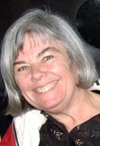 Nancy Harrison Nancy Harrison
cruise & tour specialist
(619) 265-0808
Issue Dedications
|
|
